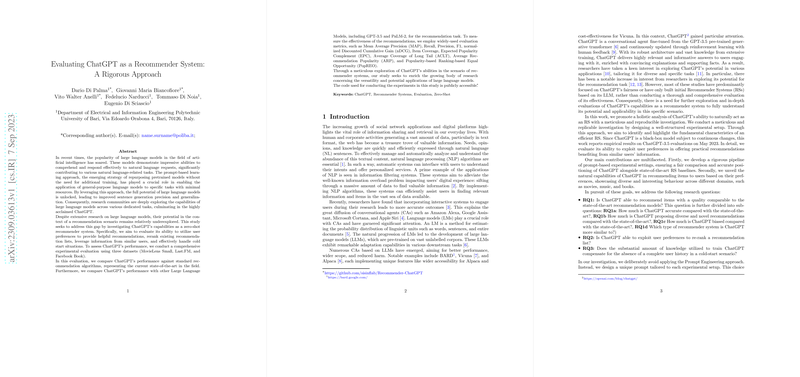Evaluating the Potential of ChatGPT as a Recommender System
Introduction
Recommendation systems are an integral part of our digital lives, guiding us through vast seas of options to suggest products, content, and information tailored to our tastes. A paper delved into the capabilities of a particular type of system, ChatGPT, within this context.
Recommender Systems and ChatGPT
ChatGPT, a conversational agent based on the powerful GPT-3.5 LLM, has shown great potential as a recommender system. It has been trained on extensive data, learning to predict users' preferences and suggest items accordingly. Researchers have posed a critical question: Could this AI also excel as a recommender system, a tool to personalize suggestions in various domains like movies, music, and books?
The Study's Methodology
The paper employed a robust method to evaluate ChatGPT's recommendations against standard algorithms in the field. Researchers used three public datasets—MovieLens Small, Last.FM, and Facebook Book—to compare the performances. The evaluative benchmarks included classic metrics like Mean Average Precision and normalized Discounted Cumulative Gain, considering various aspects such as accuracy, diversity, novelty, and bias. It also included an assessment of how well ChatGPT could handle the notorious cold start problem faced by recommender systems.
Findings and Insights
The findings indicate that ChatGPT, even without optimization for the tasks, showcases promising capabilities. Performing comparably to state-of-the-art systems, it excels in understanding user preferences and recommending new items. The paper also suggests that ChatGPT, along with other LLMs, can manage cold-start scenarios effectively, where a user’s historical data is scarce or non-existent.
Despite its potential, the observations also indicate that ChatGPT's recommendations may exhibit popularity biases depending on the dataset. In terms of system similarity, the AI shows alignment with hybrid and collaborative systems rather than purely content-based approaches. Additionally, when presented with lists for re-ranking based on user preferences, it demonstrated significant improvements, leaning towards more personalized suggestions.
Future Directions
This research lays the groundwork for future studies that might explore prompt engineering or domain-specific fine-tuning. The consistent and high-performance of ChatGPT suggests it could revolutionize recommendation tasks, though it necessitates further research on enhancing performance and addressing biases.
Conclusion
The versatility of ChatGPT as a LLM extends to the field of recommenders, holding promises for personalized, efficient, and contextually relevant recommendations. Its potential application in various domains opens up possibilities for richer user experiences across digital services.
